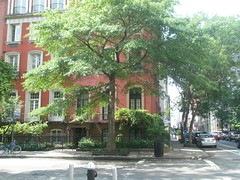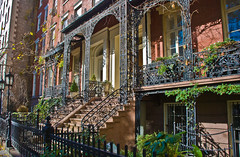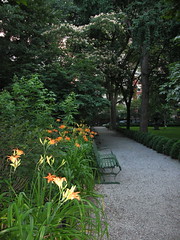West:
1 (cor- ner): Built in 1849-1850, along with its
neigh-bor to the south. Home to
Dr. Valentine Mott, surgeon who helped reorganize
Bellevue Hospital and found NYU's medical school.
2: This was the home of
Gifford Pinchot, the United
States' first professional forester. Pinchot hosted the wedding
reception of
Benjamin
Harrison here on April 6, 1896, when the former president
married Mary Scott Dimmick, the recently
widowed niece of Harrison's late first wife.
3: This and the house to its south were built in 1847
and are attributed to Alexander Jackson Davis, the most
prestigious architect of his day. They are noted for their
lacy ironwork. Actor
John Garfield died of a heart attack
at a friend's house here on May 21, 1952, at
the age of 39.
4: James Harper Sr., found- er of the pub- lishing house Harper & Brothers and former New York mayor, bought this house in 1847. The lamps out front are the traditional symbol of a mayoral residence. Bob Dylan was photographed on the steps of this house for his Highway 61 Revisited album cover. 
7 (corner): An eight-story condo building from 1930. Actor Julia Roberts has lived here. |
G
|
East:Gramercy Park New York City's only sur- viving private park. Named for Crommessie Brook,
"Crooked Little Knife" in Dutch. It was purchased by Peter
Stuyvesant from the Dutch West
India Co. in 1651, and deeded to freed slave Frans
Bastiansen in 1674. In 1761, it was acquired by James Duane, later
New York's first post-independence mayor; he named
it Gramercy Farm. It was bought in 1831 by lawyer
and developer Samuel Ruggles, who laid out Gramercy Park.
New York City's only sur- viving private park. Named for Crommessie Brook,
"Crooked Little Knife" in Dutch. It was purchased by Peter
Stuyvesant from the Dutch West
India Co. in 1651, and deeded to freed slave Frans
Bastiansen in 1674. In 1761, it was acquired by James Duane, later
New York's first post-independence mayor; he named
it Gramercy Farm. It was bought in 1831 by lawyer
and developer Samuel Ruggles, who laid out Gramercy Park.
(Across from No. 2, on January 23, 1911, writer
David Graham
Phillips was fatally shot by Fitzhugh Coyle Goldsborough,
a disturbed young man who was fixated on the idea
that one of Phillips' novels had insulted his sister.
Goldsborough then shot himself to death here.)
Each owner of the lots surrounding Gramercy Park has a share in the park—and a key to get through the gate. Disputes between key-holders over how best to maintain the park have caused bitter splits in the neighborhood. Compared to similar parks that
are open to the public like Tompkins, Washington and
|




